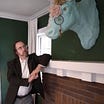It’s been a whole week since we featured some fiction here on the STSC ‘Stack, which for us feels like long enough. So just in time for the weekend we have this captivating, strong-voiced short from the incapable-of-ever-being-dull
.As always I heartily recommend you do yourself the favour of delving into his further works (especially his magazine) as well as dropping him a quick comment if you feel so inclined. It always goes a long way.
And, finally, before I leave you to it I wanted to remind everyone that this months Symposium comes out on Sunday. You don’t want to miss it and then have to live with the regret. (You can also prepare yourself by checking out our past Symposium issues here.)
Enjoy.
TJB.
Really, I thought I would have been able to make it all the way to the gas station but I underestimated the up-and-down hilly roads and it was also very windy that day. Anyway, here I was in outer mid-nowhere, North America, trudging the last four miles with a gas can, my little blue Ford Focus patiently waiting for fuel somewhere behind me, perched on the horizon. The sun had just set and it was magic hour; this would have made a good setting for a Terrence Malick film. The “town” was only about three real buildings and a small handful of dumpy-looking houses behind. I had been able to see it from way far off, because my car had died right before the top of the ridge. Just a little more, and I could have coasted into town.
There were two people out in front of the gas station: a moderately overweight old man wearing nothing but a pair of very dirty overalls and some questionable shoes held together with duct tape. He was mostly bald, and what hair he had looked like it had been close-cropped with hedge shears. He was sitting on an old bench of the kind you see in pictures of Victorian-era Central Park, but it looked like it had been repaired and fixed about a thousand times. The other person in front of the gas station was a lanky, gangly kid of about sixteen or so, leaning up on the side of the building and scratching the back of his neck with some kind of short stick. He had on a John Deere farmer’s cap that was pushed way up at a crazy angle on his head.
It was one of those ancient pumps that doesn’t take credit cards so I had to go in to pay. The fat old man greeted me with a slow “Good evening” and the kid nodded. There was a little old lady behind the counter who took my money; we remarked on the weather, and she asked me where I was headed. “Omaha,” I said, “I was out at a conference in Denver and now I’m driving home, and I thought I’d take the scenic route for fun.” She made an appreciative mumble and wished me a pleasant rest of my journey. She called me “sonny” at least twice in our short conversation.
As I pumped the gas I could hear the two guys talking.
“Way-ell, there’s yer tawkin’ fox movies, and yer tawkin’ pig movies, and they ain’t got nuthin’ similar to each other at all,’ the fat man said. “Yer tawkin’ pig movies, the pig’s always on the ground, wawkin’ alawng on his four feet, see, but the fox, he’s always bah-peedal, liken to an hyu-man bee-yin, see. That makes the whole differ-unce, in mah mind.”
“How so?” asked the kid. “Ain’t they both just tawkin’ critters?”
The fat old man adjusted himself in his seat. “So the thing is, any creature walkin’ along on the ground is gonna be seen by the audi-yence as different, as an animal, and not on their level.” He chewed a bit, and spat out some sort of brown liquid. “But the fox, because he’s wawkin’ around like a man, he’s seen by the audience as one of their own kind, see. Like in that Disney Robin Hood cartoon, or that other one they made a few years back, ‘Zootopia’ I think it was called. Or that one ‘Fantastic Mister Fox’ movie, rem’ber that one? But now think on that talkin’ pig movie from a while back, that ‘Babe’? The whole plot turns around how them talkin’ animals is different from the people; the people don’t even know the animals can talk. There’s two parallel worlds going on in that thar film, yessir.”
Sometime during the last few minutes the little old woman had come out of the gas station. She had one of those walkers with the split-apart tennis balls on the front feet. She must have caught the tail end of their conversation.
“Ya yammerin’ about that again, Parnell? Dint I jes tell you at last Thursday’s say-lon about how all talkin’ animal movies are meant as substitutes for a wahder society? And I can give you one good counter-example to all that talk about bah-peedal and quadrah-peedal: what about that there talkin’ pony cartoon a few years back? ‘Power of frienship’ or ‘Frienship is magic,’ I think was it’s name, if I recollect ackerately? Rem’ber how all them ponies was prancing around on their four hoofs all the whole movie through, and not a one of them was meant to be anything other than one of us! Go on, now! What’s it take to get one of yer tarnfounded ideers out’ta yo’ head now, huh? Jes’ cuz Dewey had ta miss the say-lon on account of his uncle’s trouble with the well pump don’t mean you have to fill his head up with ideers that I thought we’d already discussed and shot down!”
“Wait a minute,” I said. “You have a salon here?”
“Course we do, sonny,” said the little old woman. “Meets right out back’a this here gas station ever’ fourth Thursday. Mostly it’s me, and Parnell, and Dewey here (at that, the kid with the adam’s apple nodded) and old man Winkler up the road, and Suzie May from back over there, and sometimes Suzie May’s brother or mama comes, and sometimes Dewey gets his uncle Dub to come; and we set around and talk about movies, and pitchers, and books, and we read papers we done wrote—”
I interrupted. “You present papers?”
“Course we do!” she said. “Somethin’ wrong with that?”
“I . . . I guess I just didn’t excpect it,” I mumbled.
“What, you thought all that lit-rary criticism and es-thetic thinkin’ only happens in the city, where yer from? We all’s got opinions and a mind to share ‘em with whoever’ll listen, son!”
Dewey spoke. “Yeah, jus’ like Parnell is always sayin’, anyone who watches a movie or looks at a pickcher brings sumpin’ of hisself to it, and comes away with sumpin’ new to think on and sumpin’ changed about hisself—and they oughtta be able to talk about it.”
“That’s right,” Parnell said, and gave a profound nod. “Yessir, that’s right.”
I drove long, long into the night that night. Here I was, returning from a whole weekend-long conference about how the professional critical disciplines are vital to a thriving art ecosystem, but maybe I had wasted my time, because really, Parnell was right.






Well done William. It be like that sometimes.